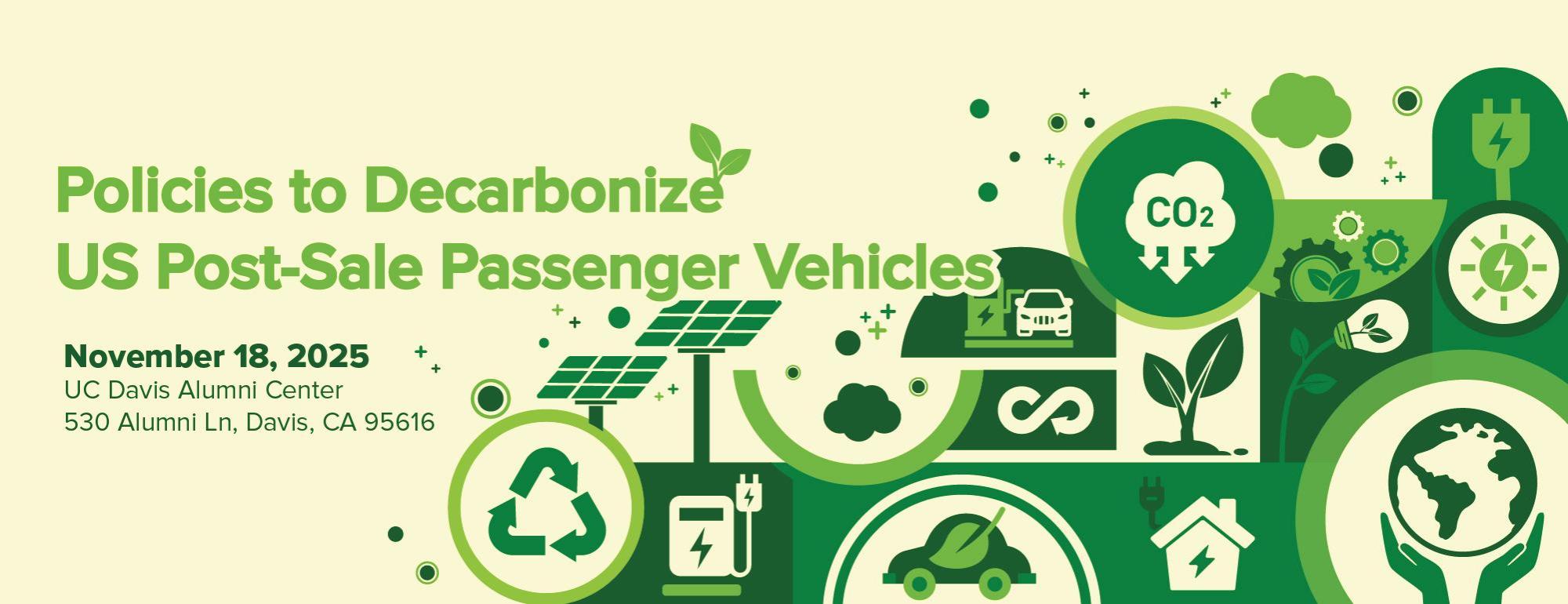
With support from the Toyota Research Institute
Introduction and Purpose of Workshop
Meeting ambitious net zero GHG emission targets requires rapid adoption of zero emission vehicle technologies. While ZEVs are anticipated to be the primary tool for decarbonizing passenger vehicles, additional strategies to decarbonize the post-sale passenger vehicle fleet may be needed to meet critical GHG reduction targets since ICEVs will remain in the vehicle stock long after 100% ZEV sales are attained.
ITS Davis is holding a workshop on November 18, 2025, with the goal of better informing policy making through improved knowledge, increased stakeholder coordination, and development of innovative policy frameworks. The objective of the workshop is to assess the most promising strategies to accelerate the decarbonization of the U.S. on-road passenger vehicle stock, focusing on post-sale vehicles. The scope of strategies that will be discussed includes accelerated scrappage, retrofitting vehicles to ZEV powertrains, and fueling ICEVs with low-GHG “drop in” liquid fuels. These strategies can be implemented alongside efforts to rapidly increase ZEV sales under existing policy, technological, and economic conditions. We note that there are many other strategies for decarbonizing transportation (e.g. travel demand reduction, vehicle fuel efficiency, electrification, etc.); these have been well-covered in scientific literature to date and are outside the scope of this project. However, the workshop will be an opportunity for participants to raise other novel strategies to decarbonize the post-sale passenger vehicle fleet.
Research Approach
For each of the three strategies, this background paper includes a qualitative description of the strategy and its policy framework; a summary what is known and what gaps in our understanding remain based on a review of selected literature (including peer-reviewed academic literature, technical reports, etc.); and identification of the key policy and research questions. The strategies are reviewed based on four main criteria: environmental impacts on a full lifecycle assessment basis, cost-effectiveness, regulatory compliance requirements, and barriers to market adoption.
After the workshop, ITS researchers will compile the input from the discussions into detailed notes and recommendations for next steps to be shared with workshop participants. The final product of the project will be a workshop paper that compiles information from the background paper, the workshop discussions, the debrief with expert advisors, and provides ITS researcher research and policy recommendations that are informed by expert advisors.
Overview of Each Strategy
Accelerated Vehicle Turnover
Presented by Katie Jordan
[Overview Forthcoming]
Retrofitting ICEVs to ZEV Powertrains
Presented by Lucas Salgado
[Overview Forthcoming]
Low-GHG “Drop in” Liquid Fuels
Presented by Colin Murphy
[Overview Forthcoming]
Agenda At-A-Glance
| 9:00 am | Welcome and Introduction to Workshop |
| 9:30 am | Session 1: Accelerated Turnover |
| 10:30 am | Session 2: Retrofitting ICEVs to ZEV Powertrains |
| 11:15 am | Session 3: Low-GHG Drop-in Liquid Fuels |
| 1:00 pm | Breakout Sessions / working sessions |
| 3:15 pm | Report Back |
| 4:15 pm | Wrap up / Summary / Next Steps / Closing Remarks |
| 5:15 pm | End |

